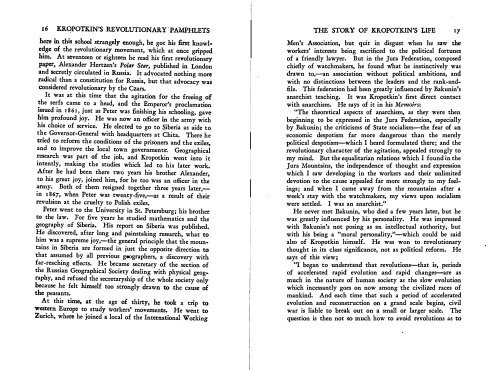Kropotkin's Revolutionary Pamphlets - Libcom
Kropotkin's Revolutionary Pamphlets - Libcom
Kropotkin's Revolutionary Pamphlets - Libcom
Create successful ePaper yourself
Turn your PDF publications into a flip-book with our unique Google optimized e-Paper software.
16 KR.OPOTKIN'S REVOLUTIONARY PAMPHLETS<br />
THE STORY OF KR.OPOTKIN'S LIFE 17<br />
here in this school strangely enough, he got his first knowledge<br />
of the revolutionary movement, which at once gripped<br />
.him. At seventeen or eighteen he read his first revolutionary<br />
paper, Alexander Hertzen's PQltn' Sttn', published in London<br />
and secretly circulated in R.ussia. It advocated nothing more<br />
radical than a constitution for Russia, but that advocacy was<br />
considered revolutionary by the Czars.<br />
It was at this time that the agitation for the freeing of<br />
the serfs came to a head, and the Emperor's proclamation<br />
ued in 1861, just as Peter was finishing his schooling, gave<br />
hun profound joy. He was nOw an officer in the army with<br />
his choice of service. He elected to go to Siberia as aide to<br />
the Governor-General with headquarters at Chita. There he<br />
tried to<br />
.<br />
reform the conditions of the prisoners and the exiles,<br />
and to Improve the local town governments. Geographical<br />
research was part of the job, and Kropotkin went into it<br />
intently, making the studies which led to his later work.<br />
After he had been there two years his brother Alexander,<br />
to his great joy, joined him, for he too was an officer in the<br />
army. Both of them resigned together three years later, .. -<br />
in I867 when Peter was twenty-five,--as a result of their<br />
revulsion at the cruelty to Polish exiles.<br />
Peter went to the University in St. Petersburg; his brother<br />
to the law. For nve years he studied mathematics and the<br />
geography of Siberia. His report on Siberia was published.<br />
He discovered, after long and painstaking research, what to<br />
him was a S".1preme joy,-the general principle that the mountains<br />
in Siberia are formed in just the opposite direction to<br />
that assumed by all previous geographers, a discovery with<br />
far-reaching effects. He became secretary of the section of<br />
the Russian Geographical Society dealing with physical geography,<br />
and refused the secretaryship of the whole society only<br />
because he felt himself too strongly drawn to :the cause of<br />
the peasants.<br />
At this time, at the age of thirty, he took a trip to<br />
western Europe to study workers' movements. He went to<br />
Zurich, where he joined a local of the International WOt;king<br />
Men's Association, but quit in disgust when he· saw the<br />
workers' interests being sacrificed to the political fortunes<br />
of a friendly lawyer. But in the Jura Federation, composed<br />
chiefly of watchmakers, he found what he instinctively was<br />
drawn to,-an association without political ambitions, and<br />
with no distinctions between the leaders and the rank-and.<br />
:file. This federation had been greatly influenced by Bakunin's<br />
anarchist teaching. It was <strong>Kropotkin's</strong> nrst direct contact<br />
with anarchism. He says of it in his Memoirs:<br />
"The theoretical aspects of anarchism, as they were then<br />
beginning to be expressed in the Jura Federation, especially<br />
by Bakunin; the criticisms of State socialism-the fear of an<br />
economic despotism far more dangerous than the merely<br />
political despotism-which I heard formulated there; and the<br />
revolutionary character of the agitation, appealed strongly to<br />
my mind. But the equalitarian relations which I found in the<br />
Jura Mountains, the independence of thought and expression<br />
which I saw developing in the workers and their unlimited<br />
devotion to the cause appealed far more strongly to my feelings;<br />
and when I came away from the mountains after a<br />
week's stay with the watchmakers, my views upon socialism<br />
were settled. I was an anarchist:'<br />
He never met Bakunin, who died a few years later, but he<br />
was greatly influenced by his personality. He was impressed<br />
with Bakunin's not posing as an intellectual authority, but<br />
with his being a "moral personality,"-which could be said<br />
also of Kropotkin himself. He was won to revolutionary<br />
thought in its class signi:6cance, not as political reform. He<br />
says of this view;<br />
"I began to understand that revolutions-that is, periods<br />
of accelerated rapid evolution and rapid changes-are as<br />
much in the nature of human society as the slow evolution<br />
which incessantly goes on now among the civilized races of<br />
mankind. And each time that such a period of accelerated<br />
evolution and reconstruction on a grand scale begins, civil<br />
war is liable to break out on a small or larger scale. The<br />
question is then not SO much how to avoid revolutions as to

















